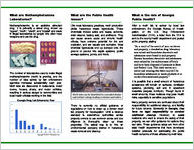What are Methamphetamine Laboratories?
Methamphetamine is an addictive stimulant drug. It is primarily a street drug, known as "speed", "meth", "crank", and "crystal" and made in illegal laboratories by people who often have weapons and use the drug.
The number of laboratories used to make illegal methamphetamine (meth) is growing, and the number of labs seized by law enforcement agencies increases substantially each year. Meth labs are discovered in restaurants, motel rooms, houses, sheds, and motor vehicles, resulting in serious danger to communities and local health officials working in the field.
Georgia Drug Lab Seizures by Year
Copyright 2015 Homefacts.com
What are the Public Health Issues?
Like most laboratory practices, meth production yields hazardous waste byproducts. These chemicals include acids and bases, solvents, drain cleaner, battery acid, and antifreeze. They can cause severe acute and chronic health effects, have extreme potential for fire and explosion, and are caustic and corrosive. Most chemical byproducts end up dumped onto the ground or poured into septic systems, public sewage systems, ponds, and rivers.
Meth labs can be identified by corroded drains and rubber tubing leading to drains and toilets
There is currently no official guidance or regulations on how to clean up a former meth lab property for reoccupation. Until a cleanup standard is determined, authorities advise property owners to use common sense and due diligence to thoroughly clean up these properties. The safest way is to hire an environmental company trained in hazardous waste removal and cleanup.
What is the role of Georgia
Public Health?
After a meth lab is seized by local law enforcement, the Georgia Bureau of Investigation, or the U.S. Drug Enforcement Administration (DEA), a letter from the DEA is sent to the county health department and posted at the property, stating:
"As a result of the search of your residence and property, a clandestine drug laboratory was seized and hazardous chemicals and substances were found at said property. Known hazardous chemicals and substances were seized by law enforcement officials and have been disposed of pursuant to State and Federal Law. This letter serves as a notice and warning that there may still be hazardous substances or waste products at or on the aforementioned property."
It is possible that a small amount of hazardous substances will remain on surfaces, ventilation systems, plumbing, soil and in absorbent materials (carpets, furniture). Though found in small amounts, these residues may pose health risks, especially to sensitive populations.
Many property owners are confused about their responsibility for additional cleanup, and liability for future tenants. Currently in Georgia, they have no legal responsibility to conduct additional cleanup. However, to assist residents who want to ensure the safety of their property, we can offer guidance for actions they can take. These guidance steps are from other state health departments that have developed detailed protocols for addressing the public health concerns of those affected by meth labs.
Meth Lab Cleanup Guidance
The Georgia Department of Public Health, Chemical Hazards Program, receives many requests regarding methamphetamine "meth" laboratory cleanup, the potential health effects from exposure to chemicals at these sites, and public health agencies' roles and responsibilities.
There are no federal, state, or county rules, laws, or protocols for public health involvement at these sites. In Georgia, all aspects of these and other clandestine laboratories are managed by local law enforcement, the Georgia Bureau of Investigation, and the U.S. Drug Enforcement Administration, using federal funds, regulations, and protocols.
The chemicals used in meth production are common household and agricultural
chemicals (volatile organics) and are most dangerous as an explosion hazard WHEN THE LAB IS IN USE.
Post closure, there are minimal health hazards once the chemicals and packaging is removed and the property is aired out.
States with methamphetamine residue cleanup levels are NOT providing evidence
that there is a health concern. If the property will be occupied with infants and small children, replace carpets and cloth furniture if sensitive populations may have
repeated, direct contact with these items.
If you suspect a methamphetamine laboratory,
do not enter the area. Call 911
or contact your local law enforcement agency.
Contact Information
CHEMICAL HAZARDS PROGRAM Georgia Department of Public Health
2 Peachtree Street, 13th Floor Atlanta, Georgia 30303 (404) 657-6534 (404) 657-6533 (Fax)
www.dph.georgia.gov/chemical-hazards
FIELD SAFETY SERIES
METHAMPHETAMINE "METH"
LABORATORIES
CHEMICAL HAZARDS PROGRAM
Environmental Health Section
